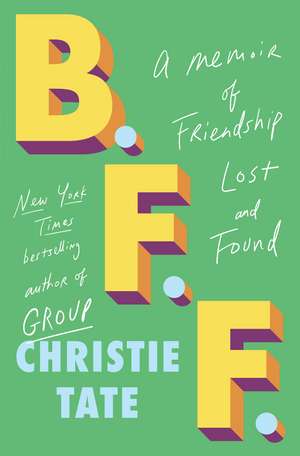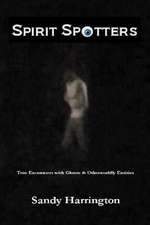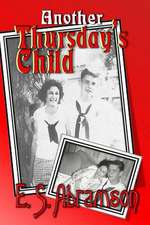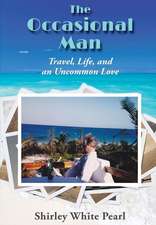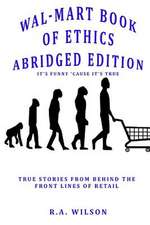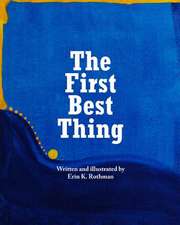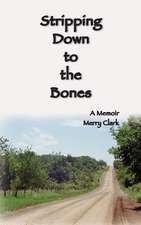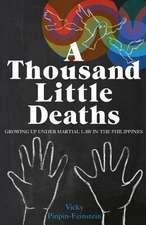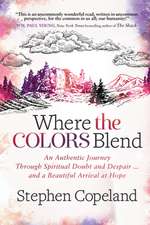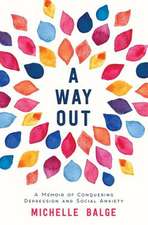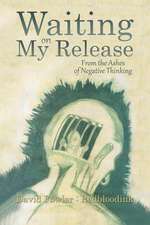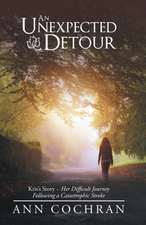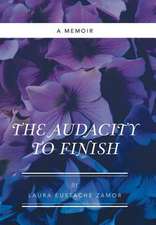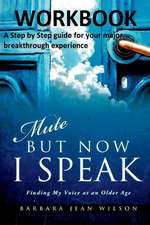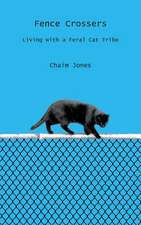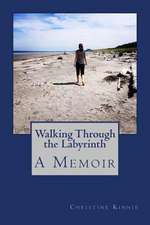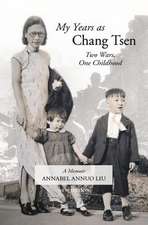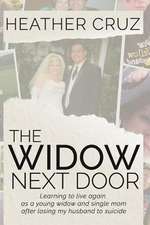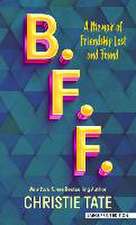BFF: A Memoir of Friendship Lost and Found
Autor Christie Tateen Limba Engleză Hardback – 29 mar 2023
From the author of Group, a New York Times bestseller and Reese’s Book Club Pick, comes a moving, heartwarming, and powerful memoir about Christie Tate’s lifelong struggle to sustain female friendship, and the friend who helps her find the human connection she seeks.
After more than a decade of dead-end dates and dysfunctional relationships, Christie Tate has reclaimed her voice and settled down. Her days of agonizing in group therapy over guys who won’t commit are over, the grueling emotional work required to attach to another person tucked neatly into the past.
Or so she thought. Weeks after giddily sharing stories of her new boyfriend at Saturday morning recovery meetings, Christie receives a gift from a friend. Meredith, twenty years older and always impeccably accessorized, gives Christie a box of holiday-themed scarves as well as a gentle suggestion: maybe now is the perfect time to examine why friendships give her trouble. “The work never ends, right?” she says with a wink.
Christie isn’t so sure, but she soon realizes that the feeling of “apartness” that has plagued her since childhood isn’t magically going away now that she’s in a healthy romantic relationship. With Meredith by her side, she embarks on a brutally honest exploration of her friendships past and present, sorting through the ways that debilitating shame and jealousy have kept the lasting bonds she craves out of reach—and how she can overcome a history of letting go too soon. But when Meredith becomes ill and Christie’s baggage threatens to muddy their final days, she’s forced to face her deepest fears in honor of the woman who finally showed her how to be a friend.
Poignant, laugh-out-loud funny, and emotionally satisfying, B.F.F. explores what happens when we finally break the habits that impair our ability to connect with others, and the ways that one life—however messy and imperfect—can change another.
| Toate formatele și edițiile | Preț | Express |
|---|---|---|
| Paperback (1) | 69.69 lei 3-5 săpt. | +9.33 lei 6-10 zile |
| Avid Reader Press / Simon & Schuster – 13 mar 2024 | 69.69 lei 3-5 săpt. | +9.33 lei 6-10 zile |
| Hardback (1) | 153.64 lei 3-5 săpt. | +63.97 lei 6-10 zile |
| Avid Reader Press / Simon & Schuster – 29 mar 2023 | 153.64 lei 3-5 săpt. | +63.97 lei 6-10 zile |
Preț: 153.64 lei
Nou
29.40€ • 30.78$ • 24.38£
Carte disponibilă
Livrare economică 19 martie-02 aprilie
Livrare express 04-08 martie pentru 73.96 lei
Specificații
ISBN-10: 1668009420
Pagini: 304
Dimensiuni: 152 x 229 x 30 mm
Greutate: 0.46 kg
Editura: Avid Reader Press / Simon & Schuster
Colecția Avid Reader Press / Simon & Schuster
Notă biografică
Extras
1.
I met Meredith in December 1998, and I still remember her outfit. A red blazer, multicolored silk scarf, gold pin. Black leather shoes with a kitten heel. A pencil skirt. Boniest ankles you ever saw. Her hair was blond with a few gray streaks, and her manicured nails were a pale pink that today I could identify as Essie’s Ballet Slippers. She stacked multiple rings on several fingers of both hands, which clacked softly when she gestured. Later, I told her she’d looked like a meteorologist from the eighties with that scarf and pin. “I was jealous of how put together you were—the outfit, the manicure.” At the time, I was twenty-five years old; Meredith was in her mid-forties.
We met at a recovery meeting held in the back booth of a Swedish diner on the North Side of Chicago. The purpose of the meeting was to help the friends and family members of alcoholics—anyone who loved a drunk, basically—reclaim their lives from the chaos of being intimately involved with someone who drinks too much. People had been recommending this recovery program to me for many years—starting with a biology teacher in high school who knew I was dating a basketball player who liked to party—and I’d refused, even though I spent half a dozen biology classes crying over the basketball player’s infidelity and nonstop pot smoking. No, not for me. Sophomore year of college, I found my way to a different twelve-step program, one for people with eating disorders, and it helped me address the bulimia that had dogged me since I was thirteen. One recovery program was enough, thank you very much.
I’d finally decided to walk through the doors of the weird Swedish diner meeting when Liam, my boyfriend at the time, came home yet again from the bar and puked in the toilet, too blitzed to say his name, much less Goodnight, Christie, or I love you. Sex was most certainly out of the question. In those days, I spent my waking hours perseverating over the question of why Liam would pick a six-pack of Schlitz over hanging out with me, wonderful me, who was turning into an emotionally bankrupt shrew whose primary job was to tally how much he was drinking and how little we were fucking. I’d become an abacus: all I could do was count how much he drank and all the ways he disappointed me. The night before my first meeting at that Swedish diner, I’d decided there was no harm in checking out another twelve-step meeting. Meetings typically last sixty minutes, and I wasn’t terribly busy with my secretarial day job and my nighttime job of waiting for Liam to tap into some desire for me. Maybe the people at this meeting could teach me how to get my beloved to stop drinking until he blacked out.
At the time, I lived and worked on the South Side of Chicago, in Hyde Park, one hundred blocks away from the Swedish diner in Andersonville. The morning of the meeting, I woke up before six to shower, dress for work, and pack food for the day, because as soon as the meeting was over, I’d have to bolt to my Honda and book it one hundred blocks back to Hyde Park, where I worked as an administrative assistant to a prominent social sciences professor at the University of Chicago. My job entailed sending faxes, answering the phone, and tracking down my boss’s speaking fees—tasks an average sixth grader could have executed. The boss wanted me there by 9:00 a.m. sharp in case the president called at 9:01 a.m. inviting him to discuss his research at an upcoming U.N. conference.
When the diner meeting started, only five other people huddled around the table in the back corner. “Hi, I’m Meredith. Welcome. We’re a small meeting,” said a smartly dressed woman when she saw me looking around for more people. My recovery meetings for bulimia took place in hospitals and churches—solemn institutions that smelled like antibacterial soap, mold, or incense—where we sat in folding chairs or on lumpy couches. Meeting in public at a table beneath stenciled images of old-timey Swedish townspeople, I felt exposed. What if I burst into tears? What if a member of the public overheard me talking about my boyfriend’s beer tab? What if someone I knew walked in for lingonberry pancakes before work? If Meredith hadn’t spoken to me, I would have turned around and walked out.
The person in charge, seated to the right of Meredith, had short, spiky brown hair and brick red lipstick. She introduced herself as Sherri and read from pages in a blue binder. At some point, she asked if there were any newcomers. I raised my hand and said my name. Around the table, each person said “Welcome” and smiled at me. My eyes filled with tears without my permission. These people—four women and one guy—were already paying more attention to me than Liam had over the past week. Underneath the table, I picked my cuticles, a terrible habit that left my skin tender and blood-streaked. I worried that after the meeting, one of these people would pull me aside and tell me I had to break up with him, or corner me and insist I stay. I blinked and blinked, trying to keep the tears from falling.
Throughout the hour, I bobbed along the bottom of my pain, pining for the early, blissful days of my relationship with Liam when we dated long-distance: I had lived in D.C., he in Chicago. He wrote me a letter every single day, and during our monthly visits, we’d spend the weekend in bed, laughing, dozing, and getting to know each other. In our long-distance year, I rarely saw him drink, and never once saw him drunk. But since I’d moved to Chicago to be with him, he changed jobs and began working sixty-hour weeks at a consulting firm. The drinking surely relieved the pressure of his job, as well as the strain of my constant surveillance of his alcohol consumption. A few beers took the edge off my weekly reminders about how long it had been since he’d bothered to fuck me.
I prayed one of the people who’d welcomed me to the meeting would tell me how to make the drinking stop. No one offered anything close to a quick tip; there were no hacks, only suggestions that we look at our own lives. Take the focus off the alcoholic, more than one person said, which I thought was dumb because my only problem was Liam’s drinking. There were, of course, several items in my own life I was ignoring every time I fastened my laser focus on Liam’s affinity for beverages in brown bottles, such as my dead-end job that didn’t cover my mountain of student debt; my dusty-ass apartment that lacked central air and a single free inch of kitchen counter space; and my distant relationships with every other human being on the planet. I sure as hell couldn’t see that this consuming “romance” with my boyfriend had crowded out my friendships. Every single friend had gone blurry in my peripheral vision. One minute they were there, and then: vanished.
When I met Liam, I was part of a trio of friends in the same master’s program in humanities at the University of Chicago. Amy, Saren, and I ate lunch together every day on campus, discussed the readings we did for our classes, planned dinner parties, and piled in Saren’s car for shopping trips to the suburbs. We had inside jokes about our professors and the eccentric characters in our graduate program, like the woman who could not have a conversation without quoting Bertolt Brecht. We’d met each other’s parents, and when we talked about the future beyond graduate school, we assumed our friendship would remain in the center of our lives. But when I started dating Liam right after graduation, I let the friendships wither, quickly and fatally. And it wasn’t because I was too busy and blissed out from the hot sex to join my friends for Thursday-night must-see TV or sushi downtown. Liam was in our graduate program; we could have all hung out together. But I was threatened by Amy and Saren—I didn’t drink and they did, so they were livelier and looser than I was. I couldn’t have admitted it at the time, but I feared Liam would compare me to them and realize he’d mistakenly chosen the uptight teetotaler who liked to go to bed by nine thirty after spending the day battling low self-esteem and anxiety. They were a better match for him, especially Saren. She’d read everything, drove a red Bronco, and wore trendy, belted outfits. She also had an impressive job lined up with a Chicago magazine. The one time we went out as a group, she and Liam had a long, heated conversation about Studs Turkel and postcapitalism poverty in Chicago. From their reddened cheeks and loud voices, I could tell they were buzzed, energized. They looked like they wanted to mash their lips together. My sole contribution to the forty-five-minute conversation was “I heard they’re tearing down Cabrini-Green.” To me, the vibe between them was unmistakable, but instead of having an honest conversation with them or asking Amy for a reality check, I withdrew from the friendships, backing Liam and myself into an isolated corner so no one could see how mismatched we were.
I cut Amy and Saren out of my life with little remorse. I cared only about my faltering relationship with Liam. And it was a vicious cycle: I dumped my friends and became more isolated, which made me hold on to the unhealthy romance even tighter, because there was no else around. I lost my friends and myself, as Liam became the subject of most of my sentences. He’s under so much pressure at work. He screamed at me the other night about a coffeepot that he left on. He likes to drink at the dive bar on Oakley.
Maybe if I’d held on to the friendships, Amy and Saren could have helped me sort out my relationship. If I’d let them, they could have had a close-up view of what was happening to me and asked questions. Are you happy in this relationship? Is this working? Why are you holding on so tightly? They could have pointed out that I had no plan for the future and less than $30 in savings. They could have helped me find an apartment that didn’t make me want to die in my sweaty sleep when the temperature rose above 85 degrees.
If I’d had close friends, I would have turned to them instead of this random collection of people sitting at a diner talking about alcoholism.
During the meeting, I watched Meredith. And I listened. She talked about her mother and her sister, and I tried to figure out which one drank too much. She leaned forward when she talked, making eye contact with everyone. In her three-minute share, she mentioned having a sponsor, working the steps, and surrendering to a Higher Power. The holy trifecta of recovery meetings. By the end, I sized her up as a wise elder. She slid out of the booth five minutes before the meeting ended. “Work meeting,” she whispered to the woman sitting next to me. Her heels click-click-clicked against the diner’s tiled floor.
In Meredith, I didn’t see a friend, a confidante, a sponsor, or a sister. I didn’t have that kind of imagination. I saw a wise middle-aged woman who liked gold rings and spent her days at an important day job, where she wore blazers and managed a staff. I never dreamed we’d talk on the phone, cry on each other’s shoulders, or become each other’s family. I saw no common ground between her pain with her mother and sister and my devastation over my boyfriend’s drinking.
Anyway, I wasn’t looking for friends. I had my hands full trying to get Liam to cork the bottle and pay attention to me. He was my first great love, and I couldn’t bear the thought of living without him. If only I could get him sober, I’d have the perfect life.
Recenzii
“Tate explores . . . memories and her adult friendships with the same vulnerability that made Group such a captivating read. She’s unafraid to share the unvarnished truth about her insecurities. . . B.F.F. is an openhearted examination of the power of friendship from people who love us exactly as we are.” —BookPage
“A love story, an ode to those who shape our lives, and a close examination of one woman's inner battles in a humorous, approachable way, B.F.F. is definitely the book to give your own bestie, no matter what age.” —Zibby Owens, GMA
"B.F.F. is a love story about the miracle of friendship. But it’s also an admirably vulnerable, heartbreaking-meets-funny self-interrogation. Reckoning with failed or faltering friendships—the ones that feel like auditions for a part you're desperate to play, or high-stakes competitions, or even love triangles—means reckoning with the kind of friend you are. It means facing yourself. B.F.F. made me laugh, cry, and cringe with recognition, page after page. It made me want to pick up the phone and start calling my friends." —Maggie Smith, author of You Could Make This Place Beautiful
"A meaningful, memorable journey from inner pain to honest, open, and enduring friendship.” —Kirkus Reviews
“In her heartfelt memoir, Tate reflects on the implosion of her past female friendships . . . [She] takes accountability for her actions (‘I’m a work in progress’), and she captures the transformative power of friendship . . . Readers will be moved by this outstanding portrait of self-excavation." —Publishers Weekly (starred)
“In close parallel to her debut, Group, Tate's second memoir is another long look at a lifetime's work of healing relationships . . . Written in three understandable, relatable parts—"What It Was Like," "What Happened," "What It's Like Now"—Tate's book shows readers how deep the work had to go for her to change.” —Booklist
"Tate catapulted onto the literary scene in 2020 with Group, a gorgeous, brave, vulnerable memoir about group therapy and all the ways it scared, shaped and saved her. . . B.F.F. carries that torch, and uses it to illuminate the unexpected, unexplored corners of friendship and isolation, belonging and insecurity." —Heidi Stevens, Tribune News Service
“Tate’s chaotic yet heartwarming first book [Group] was all about the unconventional group therapy setting that helped her work through her issues with intimacy. . . In her second memoir, Tate focuses on the elusive intimacy of friendship, recounting the tumultuous, emotional and funny process of learning how to have and be a friend. It yet again strikes that perfect balance of an author spilling the dirt and baring her soul.” —BookPage
SELECTED PRAISE FOR GROUP
"Every page of this incredible memoir, Group by Christie Tate, had me thinking 'I wish I had read this book when I was 25. It would have helped me so much!'... We need each other through the good times and the bad. Please read this book with a group of friends you cherish." —Reese Witherspoon
"Tate’s hard-won willingness to become loving and to be loved ultimately shapes a story that has a lot of heart—one that goes straight to the messy center of what it means to interrogate our own limitations and deepest desires, wherever that journey may take us." —Dani Shapiro, The New York Times
"Often hilarious and ultimately very touching." —People
“[Tate's] commitment to detail serves Group well. So does her plain determination to present herself not as a victorious therapy graduate... but as an ordinary woman who has been lucky enough to beat some extraordinary demons. Group is consistently determined and grateful, with an appealing strand of self-deprecation and a deep affection for [Tate’s groupmates].” —NPR
“Fearless candor and vulnerability.” —Time
"A wild ride. . . It gets pretty raw." —The Boston Globe
"It takes courage to bare your soul in front of a therapist, but when you add six strangers to the mix, it becomes an act of faith. In Group, Christie Tate takes us on a journey that's heartbreaking and hilarious, surprising and redemptive—and, ultimately, a testament to the power of connection. Perhaps the greatest act of bravery is that Tate shared her story with us, and how lucky we are that she did." —Lori Gottlieb, New York Times bestselling author of Maybe You Should Talk to Someone
“Eugene Onegin made me want to move to Russia and Little Women made me want to have sisters. Group made me want to rewind a decade, sit with a number of strangers and one shamanic doctor, strip down and survive. This unrestrained memoir is a transporting experience and one of the most startlingly hopeful books I have ever read. It will make you want to get better, whatever better means for you." —Lisa Taddeo, New York Times bestselling author of Three Women
Descriere
From the author of Group, a New York Times bestseller and Reese’s Book Club Pick, comes a moving, heartwarming, and powerful memoir about Christie Tate’s lifelong struggle to sustain female friendship, and the friend who helps her find the human connection she seeks.
